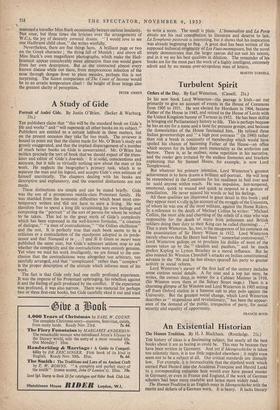Turbulent Spirit
Orders of the Day. By Earl Winterton. (Cassell. 21s.) IN his new book Lord Winterton—the peerage is Irish—set out primarily to give an account of events in the House of Commons from 1905 to 1951. He was elected for Horsham in 1904, became Father of the House in 1945, and retired to the House of Lords with the United Kingdom barony of Tumour in 1952. He has been skilful in bringing old Parliamentary history to life. This is perhaps because he has an eye for a scene and a taste for pressure groups, and because the domesticities of the House fascinated him. He refused three Indian governorships and " a high post overseas " (in 1940) rather than risk a break in continuity of membership which would have spoiled his chance of becoming Father of the House—an office which secures for its holder such immortality as the archivists can bestow. There is, as he realises, some repetition in his narrative, and the reader gets irritated by the endless footnotes and brackets explaining that Sir Samuel Hoare, for example, is now Lord Templewood. - • But whatever his primary intention, Lord Winterton's greatest achievement is to have drawn a brilliant self-portrait. He will long be remembered in the Commons for his readiness to boil over and to scald anyone within reach. He was impulsive, hotatempered, emotional, quick to wound and quick to respond to a gesture of conciliation. He never minced his words or hid his feelings. All these qualities are illustrated in great detail in this book ; and they appear most vividly in his account of the struggle of the Unionists, of whom he was one of the most militant, against the Home Rulers., In a reference to the death of Michael Collins he writes: "Michael Collins, the most able and charming of the rebels (if a man who was responsible for the death of many Irish policemen and British soldiers doing their duty to their King can be called charming) . ." That is pure Winterton. So, too, is the meagreness of his comment on the assassination of Sir Henry Wilson in 1922. Lord Winterton merely observes that Sir Henry had been " somewhat controversial." Lord Winterton gallops on to proclaim his dislike of most of the causes taken up by the " idealists and pacifists," and he much prefers Kipling to Lytton Strachey as a moral influence. But he also resisted Sir Winston Churchill's attacks on Indian constitutional advance in the '30s and he has always spurred his party to greater activity in social reform. Lord Winterton's survey of the first half of the century includes some curious social details. A fur coat and a top hat were, he writes, the correct dress in winter for a Cabinet Minister in 1910. (Sir Winston wore them at the Sidney Street siege.) There is a charming glimpse of Sir Winston and Lord Winterton in 1905 setting off from Oxford station in a hansom cab to play polo against the University. But the greatest social change, which Lord Winterton describes as " stupendous and revolutionary," has been the appear- ance of the demand of the public, irrespective of party, for social security and equality of opportunity.
FRANCIS BOYD


































 Previous page
Previous page